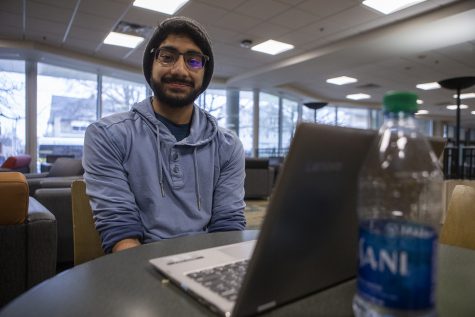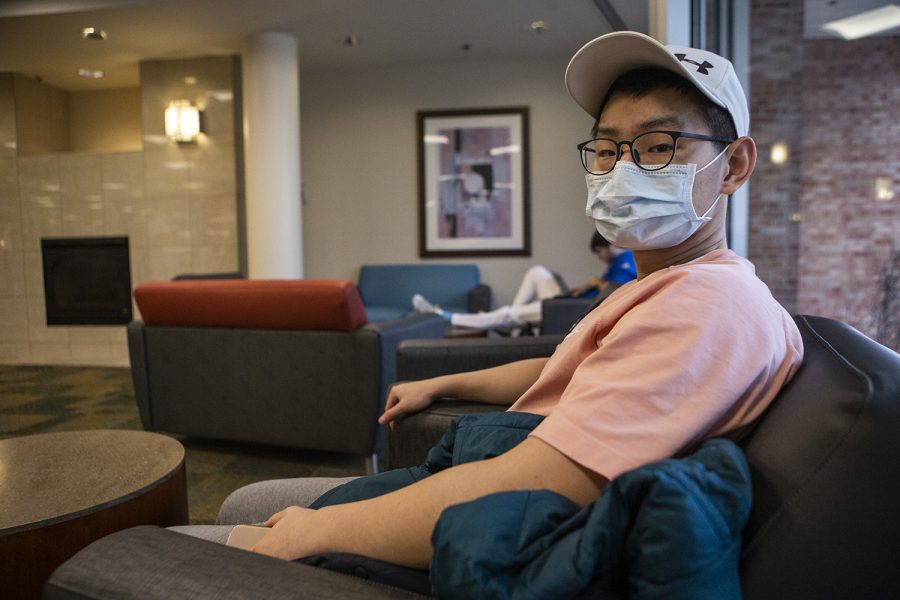UI residence halls and dining operations will remain while classes move online because of coronavirus
Students living on campus may return to their permanent residences or to the residence halls while classes are held online after spring break.
University of Iowa student sophomore Ruiqi Chen poses for a portrait in the Burge lobby on Wednesday, March 11, 2020. Chen is an international student from China studying business.
March 11, 2020
University of Iowa residence and dining halls will be open to students while classes are taught online because of the novel coronavirus pandemic, easing concerns from students particularly from outside of Iowa who feared they’d have to pack up and move out on short notice.
Students will be able to choose whether to stay at their permanent residences after break while online classes occur at least from March 23 through April 3 or come back to residence halls or off-campus housing, the UI announced Wednesday. All students were encouraged to make a decision based on what’s best for their personal health and safety.
“Some of those students don’t have other places to go, and there could also be students whose homes maybe in places that are more impacted than here, so we’re certainly not shutting down the residence halls, the food service, and the services that provide the students with the same … living environment services they had before,” UI Senior Vice President for Finance and Operations Rod Lehnertz told reporters Wednesday.

Burge resident Emily Hartman poses for a portrait on Wednesday, March 11, 2020 in the UI Main Library.
Emily Hartman, a freshman studying speech and hearing sciences from Dallas, lives in Burge but is planning to spend the next three weeks back home in Texas.
“My dad helped me change my flight today,” she said hours after the UI made the announcement.
Dining halls will remain open for students who opt to stay in the residence halls, the email said. They were asked to fill out a form emailed to students from University Housing and Dining.
Staffing and service hours may be changed “as the situation evolves,” the email read, but all students will still have access to healthy meals from the UI while living on campus and using dining halls.
Additional updates about residence-hall and dining operations will be sent to students by April 3.
Ruiqi Chen, a sophomore studying business from China, lives in Burge and is planning to stay at his dorm after break. However, he said he doesn’t have a plan if campus is later shut down.
“My parents told me to buy a mask,” he said, adding that he’s very worried about the coronavirus back home. The virus originated in Wuhan, China, and was declared a pandemic by the World Health Organization Wednesday.
However, Chen said he feels taking classes online may be easier for him to translate his lectures into his native language, because he can’t translate material while sitting in class.
Shoaib Farooqui, a sophomore studying management from Bettendorf, Iowa, is planning to return to his dorm after break — though his parents don’t see the need to because classes are online.
However, Farooqui said, he may as well come back since he’s paying money to live in the residence halls.

University of Iowa sophomore Shoaib Farooqui poses for a portrait in the Burge lobby on Wednesday, March 11, 2020. Farooqui is a Bettendorf native studying management.
“I’ll try to come back,” he said. “I’ll miss my friends.”
He added that he’s unsure about how he’ll take his midterms that he has scheduled for after spring break.
Hartman also said she has questions about how exams and classes such as her sculpture-art class will be conducted during the period where in-person classes are suspended.
She said one of her classes already switched to an online format because her professor is immunocompromised, and there was confusion on how the class would work in the new format. Some students were not able to attend the virtual class because they couldn’t figure out how to join, she said.
However, she said it’s safer for people to not be in such close quarters, especially in residence halls after many students will have traveled over spring break.
“It’s easy for disease to spread in the residence halls,” Hartman said. “… It could happen with any disease. If one person in my dorm got the flu, it’s likely I would get the flu.”
Julia Shanahan contributed to this report.
What questions do you have about the coronavirus outbreak? Let us know by filling out this form.
Follow the DI’s latest coverage of COVID-19 updates here.
View the DI’s interactive map: How are other colleges dealing with the coronavirus?






